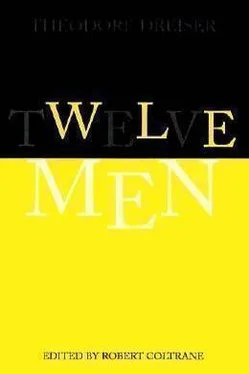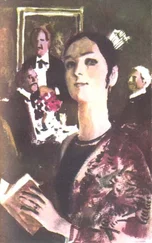Теодор Драйзер - Twelve Men
Здесь есть возможность читать онлайн «Теодор Драйзер - Twelve Men» весь текст электронной книги совершенно бесплатно (целиком полную версию без сокращений). В некоторых случаях можно слушать аудио, скачать через торрент в формате fb2 и присутствует краткое содержание. Год выпуска: 2014, Издательство: epubBooks Classics, Жанр: Биографии и Мемуары, на английском языке. Описание произведения, (предисловие) а так же отзывы посетителей доступны на портале библиотеки ЛибКат.
- Название:Twelve Men
- Автор:
- Издательство:epubBooks Classics
- Жанр:
- Год:2014
- ISBN:нет данных
- Рейтинг книги:4 / 5. Голосов: 1
-
Избранное:Добавить в избранное
- Отзывы:
-
Ваша оценка:
- 80
- 1
- 2
- 3
- 4
- 5
Twelve Men: краткое содержание, описание и аннотация
Предлагаем к чтению аннотацию, описание, краткое содержание или предисловие (зависит от того, что написал сам автор книги «Twelve Men»). Если вы не нашли необходимую информацию о книге — напишите в комментариях, мы постараемся отыскать её.
Twelve Men — читать онлайн бесплатно полную книгу (весь текст) целиком
Ниже представлен текст книги, разбитый по страницам. Система сохранения места последней прочитанной страницы, позволяет с удобством читать онлайн бесплатно книгу «Twelve Men», без необходимости каждый раз заново искать на чём Вы остановились. Поставьте закладку, и сможете в любой момент перейти на страницу, на которой закончили чтение.
Интервал:
Закладка:
I was thinking of this and of his tender relationship with children as I had noticed it, and of his service to the late colonel when one day being in the store, I said:
"Do you stand on the Bible completely, Mr. Burridge?"
"Yes, sir," he replied, "I do."
"Believe every word of it to be true?"
"Yes, sir."
"If your brother has offended you, how many times must you forgive him?"
"Seventy times seven."
"Do you forgive your brothers?"
"Yes, sir—if they repent."
"If they repent?"
"Yes, sir, if they repent. That's the interpretation. In Matthew you will find, 'If he repent, forgive him.'"
"But if you don't forgive them, even before they repent," I said, "aren't you harboring enmity?"
"No, sir, I'm not treasuring up enmity. I only refuse to forgive them."
I looked at the man, a little astonished, but he looked so sincere and earnest that I could not help smiling.
"How do you reconcile that with the command, 'Love one another?' You surely can't love and refuse to forgive them at the same time?"
"I don't refuse to forgive them," he repeated. "If John there," indicating an old man in a sun–tanned coat who happened to be passing through the store at the time, "should do me a wrong—I don't care what it was, how great or how vile—if he should come to me and say, 'Burridge, I'm sorry,'" he executed a flashing oratorical move in emphasis, and throwing back his head, exclaimed: "It's gone! It's gone! There ain't any more of it! All gone!"
I stood there quite dumbfounded by his virility, as the air vibrated with his force and feeling. So manifestly was his reading of the Bible colored by the grief of his own heart that it was almost painful to tangle him with it. Goodness and mercy colored all his ideas, except in relation to his one–time followers, those who had formerly been his friends and now left him to himself.
"Do you still visit the poor and the afflicted, as you once did?" I asked him once.
"I'd rather not say anything about that," he replied sternly.
"But do you?"
"Yes, sir."
"Still make your annual New Year round?"
"Yes, sir."
"Well, you'll get your reward for that, whatever you believe."
"I've had my reward," he said slowly.
"Had it?"
"Yes, sir, had it. Every hand that's been lifted to receive the little I had to offer has been my reward."
He smiled, and then said in seemingly the most untimely way:
"I remember once going to a lonely woman here on New Year's Day and taking her a little something—basket of grapes or fruit of some kind it was. I was stopping a minute—never stay long, you know; just run in and say 'Happy New Year!' leave what I have and get out—and so said, 'Good morning, Aunt Mary!'
"'Good morning, Elihu,' says she.
"'Can't stay long, Aunt Mary,' I said. 'Just want to leave you these. Happy New Year!'
"Well, sir, you know I was just turning around and starting when she caught hold of my sleeve and says:
"'Elihu Burridge,' she says, 'give me that hand!' and do you know, before I knew what she was about she took it up to her lips and kissed it! Yes, she did—kissed my hand!
"Now," he said, drawing himself up, with eyes bright with intense feeling, "you know whether I've had my reward or not, don't you?"
"Vanity, Vanity," Saith the Preacher
Sometimes a single life will clearly and effectively illustrate a period. Hence, to me, the importance of this one.
I first met X― at a time when American financial methods and American finances were at their apex of daring and splendor, and when the world was in a more or less tolerant mood toward their grandiose manners and achievements. It was the golden day of Mr. Morgan, Senior, Mr. Belmont, Mr. Harriman, Mr. Sage, Mr. Gates, Mr. Brady, and many, many others who were still extant and ruling distinctly and drastically, as was proved by the panic of 1907. In opposition to them and yet imitating their methods, now an old story to those who have read "Frenzied Finance," "Lawless Wealth," and other such exposures of the methods which produced our enormous American fortunes, were such younger men as Charles W. Morse (the victim of the 1907 panic), F. Augustus Heinze (another if less conspicuous victim of the same "panic"), E.R. Thomas, an ambitious young millionaire, himself born to money, David A. Sullivan, and X―. I refuse to mention his name because he is still alive although no longer conspicuous, and anxious perhaps to avoid the uncomfortable glare of publicity when all the honors and comforts which made it endurable in the first place are absent.
The person who made X― essentially interesting to me long before I met him was one Lucien de Shay, a ne'er–do–well pianist and voice culturist, who was also a connoisseur in the matters of rugs, hangings, paintings and furniture, things in which X― was just then most intensely interested, erecting, as he was, a great house on Long Island and but newly blossoming into the world of art or fashion or culture or show—those various things which the American multi–millionaire always wants to blossom or bloom into and which he does not always succeed in doing. De Shay was one of those odd natures so common to the metropolis—half artist and half man of fashion who attach themselves so readily to men of strength and wealth, often as advisors and counselors in all matters of taste, social form and social progress. How this particular person was rewarded I never quite knew, whether in cash or something else. He was also a semi–confidant of mine, furnishing me "tips" and material of one sort and another in connection with the various publications I was then managing. As it turned out later, X― was not exactly a multi–millionaire as yet, merely a fledgling, although the possibilities were there and his aims and ambitions were fast nearing a practical triumph the end of which of course was to be, as in the case of nearly all American multi–millionaires of the newer and quicker order, bohemian or exotic and fleshly rather than cultural or æsthetic pleasure, although the latter were never really exactly ignored.
But even so. He was a typical multi–millionaire in the showy and even gaudy sense of the time. For if the staid and conservative and socially well–placed rich have the great houses and the ease and the luxury of paraphernalia, the bohemian rich of the X― type have the flare, recklessness and imagination which lend to their spendings and flutterings a sparkle and a shine which the others can never hope to match.
Said this friend of mine to me one day: "Listen, I want you to meet this man X―. You will like him. He is fine. You haven't any idea what a fascinating person he really is. He looks like a Russian Grand Duke. He has the manners and the tastes of a Medici or a Borgia. He is building a great house down on Long Island that once it is done will have cost him five or six hundred thousand. It's worth seeing already. His studio here in the C― studio building is a dream. It's thick with the loveliest kinds of things. I've helped buy them myself. And he isn't dull. He wrote a book at twenty, 'Icarus,' which is not bad either and which he says is something like himself. He has read your book ("Sister Carrie") and he sympathizes with that man Hurstwood. Says parts of it remind him of his own struggles. That's why he wants to meet you. He once worked on the newspapers too. God knows how he is making his money, but I know how he is spending it. He's decided to live, and he's doing it splendidly. It's wonderful."
I took notice, although I had never even heard of the man. There were so very, very many rich men in America. Later I heard much more concerning him from this same de Shay. Once he had been so far down in the scale that he had to shine shoes for a living. Once he had walked the streets of New York in the snow, his shoes cracked and broken, no overcoat, not even a warm suit. He had come here a penniless emigrant from Russia. Now he controlled four banks, one trust company, an insurance company, a fire insurance company, a great real estate venture somewhere, and what not. Naturally all of this interested me greatly. When are we indifferent to a rise from nothing to something?
Читать дальшеИнтервал:
Закладка:
Похожие книги на «Twelve Men»
Представляем Вашему вниманию похожие книги на «Twelve Men» списком для выбора. Мы отобрали схожую по названию и смыслу литературу в надежде предоставить читателям больше вариантов отыскать новые, интересные, ещё непрочитанные произведения.
Обсуждение, отзывы о книге «Twelve Men» и просто собственные мнения читателей. Оставьте ваши комментарии, напишите, что Вы думаете о произведении, его смысле или главных героях. Укажите что конкретно понравилось, а что нет, и почему Вы так считаете.









